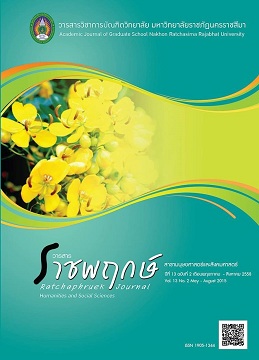ผลของโปรแกรมลดน้ำหนักโดยประยุกต์ใช้ทฤษฎีการรับรู้สมรรถนะแห่งตน ทฤษฎีขั้นตอนการเปลี่ยนแปลงพฤติกรรมร่วมกับทฤษฎีแรงสนับสนุนทางสังคมของนักศึกษาพยาบาลที่มีภาวะน้ำหนักเกินมาตราฐาน มหาวิทยาลัยราชธานี
Main Article Content
Abstract
การวิจัยครั้งนี้มีวัตถุประสงค์ เพื่อพัฒนาโปรแกรมการลดน้ำหนัก และเพื่อเปรียบเทียบผลของโปรแกรมลดน้ำหนัก โดยประยุกต์ใช้ทฤษฎีการรับรู้สมรรถนะแห่งตน ทฤษฎีขั้นตอนการเปลี่ยนแปลงพฤติกรรม ร่วมกับแรงสนับสนุนทางสังคมของนักศึกษาพยาบาลที่มีภาวะน้ำหนักเกินมาตรฐาน มหาวิทยาลัยราชธานี โดยตัวอย่างเป็นนักศึกษาพยาบาล มหาวิทยาลัยราชธานี จำนวน 80 คน แบ่งเป็นกลุ่มทดลอง และกลุ่มควบคุม อย่างละ 40 คน ซึ่งได้มาจากการเลือกแบบเจาะจง เครื่องมือที่ใช้ในการวิจัย ประกอบด้วย โปรแกรมการลดน้ำหนักโดยประยุกต์ใช้ทฤษฎีการรับรู้สมรรถนะแห่งตน ทฤษฎีขั้นตอนการเปลี่ยนแปลงพฤติกรรมร่วมกับทฤษฎีแรงสนับสนุนทางสังคม แบบสอบถามข้อมูลทั่วไป แบบสอบถามระยะพฤติกรรม แบบสอบถามความเชื่อมั่นในสมรรถนะตนเอง แบบสอบถามความคาดหวังผลลัพธ์ในการลดน้ำหนักแบบสอบถามความรู้เรื่องโรคอ้วนและพฤติกรรมการลดน้ำหนัก แบบสอบถามแรงสนับสนุนทางสังคม ใช้ในการเก็บข้อมูลก่อนและหลังการทดลอง ซึ่งมีค่าความเชื่อมั่นอยู่ระหว่าง .81-.91
สถิติที่ใช้ในการวิเคราะห์ข้อมูล ได้แก่ การแจกแจงความถี่ ร้อยละ ค่าเฉลี่ย ส่วนเบี่ยงเบนมาตรฐาน สถิติทดสอบ ด้วยวิธี Mann Whitney U test และ Wilcoxon Signed Rang Test
ผลการวิจัยพบว่า
1. การพัฒนาโปรแกรมลดน้ำหนักโดยประยุกต์ใช้ทฤษฎีการรับรู้สมรรถนะแห่งตน ทฤษฎีขั้นตอนการเปลี่ยนแปลงพฤติกรรมร่วมกับทฤษฎีแรงสนับสนุนทางสังคมของนักศึกษาพยาบาลที่มีภาวะน้ำหนักเกินมาตรฐาน มหาวิทยาลัยราชธานีทำให้ได้โปรแกรมลดน้ำหนักโดยประยุกต์ใช้ทฤษฎีการรับรู้สมรรถนะแห่งตน ทฤษฎีขั้นตอนการเปลี่ยนแปลงพฤติกรรม ร่วมกับทฤษฎีแรงสนับสนุนทางสังคม
2. ผลของโปรแกรมลดน้ำหนักโดยประยุกต์ใช้ทฤษฎีการรับรู้สมรรถนะแห่งตน ทฤษฎีขั้นตอนการเปลี่ยนแปลงพฤติกรรม ร่วมกับแรงสนับสนุนทางสังคม ของนักศึกษาพยาบาลที่มีภาวะน้ำหนักเกินมาตรฐาน มหาวิทยาลัยราชธานี พบว่า ภายหลังการทดลอง กลุ่มทดลองมี ด้านความรู้เกี่ยวกับโรคอ้วนและการลดน้ำหนัก ด้านการรับรู้สมรรถนะแห่งตน ด้านความคาดหวังผลลัพธ์ในการลดน้ำหนัก ด้านพฤติกรรมการลดน้ำหนัก ด้านแรงสนับสนุนทางสังคม สูงกว่ากลุ่มควบคุมมีค่าดัชนีมวลกาย (BMI) ต่ำกว่ากลุ่มควบคุม และ มีค่าเฉลี่ยของคะแนนในภาพรวม กลุ่มทดลอง และ กลุ่มควบคุมแตกต่างกัน อย่างมีนัยสำคัญทางสถิติที่ระดับ .05
The Effects of a Dietary Program by Modification Self-Efficacy Theory the Implement to Stages of Change Model and Social Support Theory for Nursing Students with Overweight of Ratchathani University
The research aimed to develop and compare the effects of a dietary program by modification self-efficacy theory, the implement to stages of change model and social support theory for nursing students with overweight at Ratchathani University. 80 students were purposively selected and divided as an experimental group and a controlled group equally. The research instruments were a dietary program of modification self-efficacy theory, the implement to stages of change model and social support theory. Also, questionnaire on general information, state behavior, self- efficacy, expectance result in weight loss, knowledge of obesity and behavior weight loss and social support. The pretest and posttest show their reliability between .80-.91. Statistics used in data analysis were frequency, percentage, mean, standard deviation, Mann-Whitney U Test , and Wilcoxon Signed Ranks Test
The research findings were as follows:
1. The dietary program was developed by modification self-efficacy theory, the implement to stages of change model and social support theory for Ratchathani University nursing students with overweight.
2. The effects of a dietary program by using the modification self-efficacy theory, the implement to stages of change model and social support theory for nursing students with overweight. After posttest, it was found that the experimental group had knowledge of obesity and behavior weight loss, recognition self-efficacy, the expectance result in weight loss, behavior weight loss and social support higher than the controlled group, which showed BMI was lower than controlled group (0.05). The average of the overall score was different with statistical significance of .05 level.


